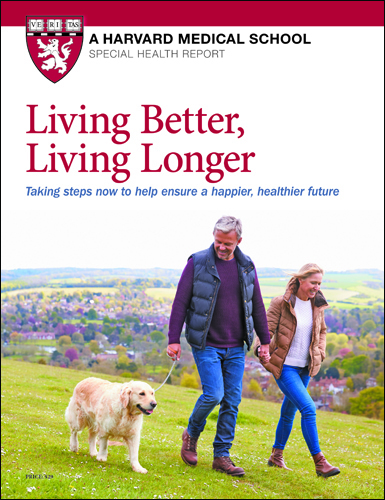Should you read your doctor's notes?
The information can help you manage both health and illness.
- Reviewed by Anthony L. Komaroff, MD, Editor in Chief, Harvard Health Letter; Editorial Advisory Board Member, Harvard Health Publishing

Every time you see your health care providers, they jot down notes about the visit. The notes describe your symptoms, physical examination, test results, their diagnosis, and their plan (tests and treatments they have ordered). But until recently, that information was difficult for you to obtain.
"Notes had been carefully hidden from you by invisible walls in your computerized 'electronic medical record.' Now the walls have been taken down," says Dr. Tom Delbanco, the John F. Keane & Family Professor of Medicine at Harvard Medical School and a physician at Harvard-affiliated Beth Israel Deaconess Medical Center. He and his colleague Jan Walker, an associate professor of medicine at Harvard Medical School, founded the OpenNotes initiative, which has led to the sharing of notes, or "open notes," to become the standard of care.
It's the law
In the spring of 2021, the 21st Century Cures Act began requiring that almost all of your health information be made available to you, typically through your patient portal, without charge and without delay. That information must include the notes of any doctors or other experts who have cared for you, including interpretations of medical test results and summaries of your care in a hospital.
There are exceptions. For example, information prepared for civil or criminal proceedings may be excluded. The same is true for some psychotherapy notes.
But over all, if your health care providers won't share notes with you, and you file a complaint, they can be fined. You can learn more about which notes you're entitled to, and how to file a complaint, by visiting OpenNotes (www.opennotes.org).
The benefits of reading notes
Is it a good thing for you to have access to all this information? Before it was required, many doctors and even some patients weren't so sure. However, many studies over the past 10 years have indicated that reading your health care provider's notes has solid benefits.
"You can go home, sit on a couch, and review what happened and what your doctor wrote down," Dr. Delbanco says. "You can remind yourself why you're taking medications, and which ones you really need to take. You can go over your treatment plans and whether you have to send in any specimens, take any tests, or make appointments with specialists before your next visit."
Reviewing the notes can also
- answer questions you have after an appointment
- help you manage your health with greater confidence
- enable you to share important medical information with family members or caregivers
- build trust with your doctor, nurse, or other clinicians
- give you the chance to catch mistakes.
"In one study, 25% of doctors said their patients picked up an important mistake in a record. Sometimes it's the wrong patient's record in the chart. Or it might be a missed x-ray finding or an inaccurate description of a knee problem," Dr. Delbanco says.
Risks from reading notes
Reading your health care provider's notes may also have some risks. You may feel scared or anxious about what you see.
And some people find a doctor's shorthand offensive. "We have our own abbreviations and language," Dr. Delbanco says. "To me, SOB means 'shortness of breath,' but to a patient it may mean something else. Also, doctors tend to use language that comes across as judgmental. For example, we were taught to say, 'The patient denies chest pain.' You're not denying it, you're just saying you don't have it. Obesity is another tricky word. To me, it's a technical term referring to body mass index, but referring to a patient as 'obese' may sound like a criticism. In one study, 10% to 15% of patients who read their notes felt they contained offensive language, and that's bad."
But doctors are learning to change the way they write notes. "We just got a grant to introduce 'open notes' into the Harvard Medical School curriculum, focusing in particular on how both medical students and their teachers should learn to address racial, socioeconomic, and language differences," Dr. Delbanco says.
Confronting your doctor
What should you do if you find information that's wrong or offensive? "Don't be afraid to point out mistakes. Call your doctor's office. And if you're offended, bring it up at your next appointment," Dr. Delbanco says. "The fear is that the doctor will be angry. Hopefully, you have a good relationship with your doctor and can say, 'I think you got this wrong,' and then enter into a productive discussion of a potentially tricky issue."
If your doctor isn't providing notes in your patient portal, and you'd like to see them, speak up. "You're supposed to have access," Dr. Delbanco says. "If your doctor says it's not in your best interest, you can disagree. Remember, there are teeth behind the law."
Image: © monkeybusinessimages/Getty Images
About the Author

Heidi Godman, Executive Editor, Harvard Health Letter
About the Reviewer

Anthony L. Komaroff, MD, Editor in Chief, Harvard Health Letter; Editorial Advisory Board Member, Harvard Health Publishing
Disclaimer:
As a service to our readers, Harvard Health Publishing provides access to our library of archived content. Please note the date of last review or update on all articles.
No content on this site, regardless of date, should ever be used as a substitute for direct medical advice from your doctor or other qualified clinician.
















